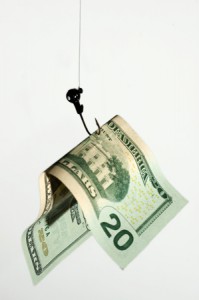 The internet has opened up a whole new playground to the scammers of the world. No need to install fancy card skimming devices. They can set up their seedy operations from the dark and dingy living rooms of their own homes.
The internet has opened up a whole new playground to the scammers of the world. No need to install fancy card skimming devices. They can set up their seedy operations from the dark and dingy living rooms of their own homes.
While the internet presents a global market of opportunity for legitimate businesses, unfortunately it also presents those same opportunities to people who are intent on relieving you of your money any way they can.
Some of these operations are so sophisticated they can be very hard to spot. Online scams are everywhere and internet users always need to remain vigilant. Sometimes all it takes is one wrong mouse click for the damage to be done.
Fortunately there are tell-tale signs that something is not right. If you keep your wits about you and never rush into anything when surfing the net you will remain pretty safe. If you are ever thinking of joining any sort of program that requires you to pay money upfront, do your research first.
Whether something is a scam or legitimate, there are bound to be many other internet users out there – ones who will know something about the company or venture you are considering getting involved with – who can steer you in the right direction with sound advice.
This post will be looking at a few of the more common ways scammers of the internet world try to trick you into either giving up your personal information, or handing over your hard-earned cash.
Not everything online is a scam. I make a decent living with my affiliate marketing business. Just check out the training I did with Wealthy Affiliate to learn how to get started. It's FREE to join!
Online Lottery Scam
 I could probably write an entire book on the subject of email scams. There are just so many of them. I’ve personally, literally received thousands of bogus emails over the years. No, a more accurate figure would probably be in the tens of thousands. Not all spam is a scam, but much of it is.
I could probably write an entire book on the subject of email scams. There are just so many of them. I’ve personally, literally received thousands of bogus emails over the years. No, a more accurate figure would probably be in the tens of thousands. Not all spam is a scam, but much of it is.
One of the most common ones is the online lottery.
Ignore any email that claims you have won a large sum of money. Unless you know exactly where this email is being sent from – like your local lottery agency that you have given permission to email you – then it is a scam; either attempting to garner your personal details, or trying to take money from you somehow.
If all these emails about winning some bogus online lottery were real, I wouldn’t even be bothered writing content for this site anymore. I’d be way too busy spending my billions of dollars! If only these emails were real. I’d be so filthy stinking rich by now and loving life. I even receive text messages occasionally telling me I’ve won millions.
Some of these schemers even try to impersonate a famous company such as Microsoft or Google, telling you you’ve won money in their annual sweepstakes competition that you never entered, and that your lucky email was drawn randomly as the winner.
There will always be an immediate call to action in these emails, hoping you will act quickly in giving over your information before the deadline. What the scammers really want to achieve is to try and get you to act before you’ve had time to think about it and realise it’s a scam.
Sometimes they ask for money in the form of fees to cover processing and administration costs related to giving you your winnings. At times you may even receive a fake cheque as part payment of your winnings, but these cheques always bounce.
My advice: If you get one of these emails, just delete it right away. You may get a laugh out of reading some of them, but ultimately just ignore them and trash them.
Nigerian Scam
 This is one of my personal favourites. I’ve lost count of the number of email scam letters I’ve received from Nigeria. Once I even received a letter from the Nigerian Chief of Police himself, begging me to take millions of British pounds off his hands.
This is one of my personal favourites. I’ve lost count of the number of email scam letters I’ve received from Nigeria. Once I even received a letter from the Nigerian Chief of Police himself, begging me to take millions of British pounds off his hands.
He even told me I could trust him because he was the Nigerian Chief of Police. I must admit, knowing that made me feel so much better. Of course I could trust him. So what if he was from Nigeria? He was the Chief of Police. Obviously legit haha.
These work in a similar fashion to the lottery scams. Scam artists want your bank account details to deposit these funds. Often there will be a fee involved in order for your funds to be deposited to your nominated account – an account they want to steal from. First you pay the fee, then you get your money. No, you just pay the fee and the scammer says thanks very much for the money and all your personal details.
Often these emails will declare that some rich person has died; a prince, a relative of the email’s author, and they need to get this deceased person’s fortune out of the country. That’s where you come in.
You’ll be doing them such a stupendous favour by allowing them to deposit millions of dollars into your bank account that they’ll be willing to reward you handsomely for your good deed. And even if they did genuinely transfer millions to your account, it’s more than likely a money laundering scheme and you’ll get arrested for being an accomplice.
Some of these emails can be quite humorous to read, actually, and there’s no harm in having a laugh. Just so long as you never act of the BS within the email.
Copy how I make $1000s a month legitimately online!
Phishing Scam
This is where the sophisticated scammers come into play.
Perpetrators will send out official-looking emails representing real companies, trying to get your personal details, bank account details, or your important passwords to various internet accounts you may have.
 I’ve had plenty of these. One of the most common ones I get is from PayPal, telling me my account has been limited and to log in via a link in the email to verify my details. Some of these are well-worded while others are written in broken English.
I’ve had plenty of these. One of the most common ones I get is from PayPal, telling me my account has been limited and to log in via a link in the email to verify my details. Some of these are well-worded while others are written in broken English.
Guess it depends on which country the email originated from. PayPal, like most financial institutions, will never send you an email addressed to “Dear Valued Customer”. Your full name will always be in the email. It’s the same with banks, eBay, Amazon, iTunes. Anywhere official that you have an account, you will almost always be addressed by your full name.
NEVER click on any links within any of these emails, and certainly never give up your valuable password. If you receive an email from a company you are a customer of and it looks suspect, open up a tab in your browser and enter the website the usual way to check on your account.
Counterfeit Websites
Another method phishing scammers use is to emulate the look of genuine websites; especially for financial institutions. If you are lured to one of these spoofed sites through a phishing email it’ll often look like the real deal, with company logos, privacy policies etc. worded in identical fashion to the real website.
The page you arrive at will typically ask you to input all your personal information, your financial details, account details, credit card numbers and expiry dates, internet banking password etcetera. This is all designed to steal both your identity and your money.
Banks will never ask you for details like this through an email. They’ll never say click this link to log in. Most legitimate companies and enterprises of any kind won’t.
If there is a genuine issue, they’ll email suggesting to call them, or they’ll call you, or they’ll instruct you to open a browser, go to their site the normal way, log in and deal with whatever the issue is.
Online Dating and Romance Scams
 Unfortunately these are common as well, and often involve relieving someone – man or woman – of their money. Sadly, at times, even someone’s entire life savings.
Unfortunately these are common as well, and often involve relieving someone – man or woman – of their money. Sadly, at times, even someone’s entire life savings.
People are often most vulnerable when it comes to this facet of life, because it’s highly emotional. Scammers play on that fact and are experts at playing people’s emotions for their own financial gain.
Men and women seeking a romantic partner are often feeling lonely and unfulfilled. Add to that the emotions of romance and longing for love, perhaps feelings of inadequacy and insecurity, and you have a tantalising cocktail mixed and served, ready for the expert scammer to drink.
Some of these schemers will spend months nurturing an online relationship just to gain your trust, and to give you time for you to develop feelings for them. Once they have your trust they’ll start asking for money for various things. It might be for visas and plane tickets to come and visit you, or money simply for survival.
Often it will start as small amounts and gradually increase. A number of times I’ve seen on the news how some lady or man was scammed out of their life savings by someone they thought was their perfect match on the other side of the world. It’s terribly said, but it happens. What’s sadder still is that there are actually people so callous who will resort to tactics such as these just to make a buck. It’s disgraceful.
NEVER…EVER send money to someone you have never met in person. If someone is genuinely interested in you they will never ask you for money for anything if you’ve never even met face to face. If someone asks you for money in this scenario, or personal details of a financial or identity nature, cut contact with them immediately.
Online Money Making Scam
There is certainly no shortage of money making scams out there. These scammers know that virtually everyone on planet earth is a  potential target, because we all need money and we all want more of it. There are:
potential target, because we all need money and we all want more of it. There are:
- Pyramid schemes
- Ponzi schemes
- Chain letters
- Money making programs and systems
- Magic money making software
Many of these bogus schemes make nobody money except the creator of the program. With Ponzi schemes, chain letters and pyramid systems, it’s usually only the people who got in on the ground level that actually make any money.
I’ve said this before in several other posts on this site that if someone had some brilliant system for making money online, why would they bother packaging it up, creating websites and videos to promote this magic system and try to sell it to you?
Why not just keep using their wonderful money-printing system themselves and make their fortune that way? Why do they feel the need to have to try and make money by selling their system?
Because it’s bullshit!
- Steer well clear of any program or system that promises riches in a very short space of time.
- Avoid anything where you arrive at a website that is just one or two pages in size, or where you cannot access other information on the site until you either cough up cash or supply a whole bunch of personal details.
- Be suspicious of schemes where there is nothing more than a long-winded video presentation that tells you nothing but spin about how much money you are going to make and how wonderful their system is and how lucky you are to have been chosen to be a part of it.
- Keep well away from anything that tells you there is a quick and easy way to get rich online. It simply isn’t true and that’s just the magic money line to lure you in, hook you and fleece your wallet.
- Do your research. If there are enough complaints about a program, system or scheme being a scam, then it’s probably true.

There Are Legitimate Ways To Make Money Online
If something sounds too good to be true, then it probably is. Yes, I know that’s a cliché, but it’s a cliché for a reason.
It’s the TRUTH!
Always do your research and due diligence before venturing into anything online; especially if it costs money.
If you’ve read other posts on my site, then you will know I am a fan of Wealthy Affiliate. If you don’t already know what Wealthy Affiliate is, you can read my review on WA here.
There are legitimate, legal and genuinely real ways to make an income online. We all need training for everything in life, and making an online income is no different. Wealthy Affiliate offer a wealth of brilliant training, and much of it is for FREE! Definitely worth checking out. Click on the link above and see just how much they have to offer the online entrepreneur.
Thanks for reading. If you have anything to add, or you know of a particular scam you would like to warn us about, please feel free to comment below.
Darren Burton
Latest posts by Darren Burton (see all)
- NeuroGym: Harnessing Neuroscience for Personal Transformation and Success - October 31, 2023
- Is Lotto Profits a Scam or Not? Read This First! - August 27, 2019
- How to Boost Your Website’s Affiliate Sales - November 22, 2018






Hi buddy,
That’s a lot of information toward online scams!
I personally have face some of them. The one that common is pyramid scheme. This usually has exaggerated claim toward wealth. But the reality is far from what we expect.
I used to deal with over thousands of dollar upsell. Now, I am more knowledgable to avoid online scams. Thanks for the warning here!
I’ve been suckered into a few pyramid schemes offline, but not on the internet. Yes, they’re very good at talking it up and showing you the pictures of the big houses and flashy cars you’re going to own in just a matter of months if you join their down line.
i was looking for some info online when your site came up and im glad it did.
some time ago when i wanted to “make money online” i got to a site which made it sound so easy.
I now say the only thing that was easy was taking my money.this scared me off, just wish i had seen your site earlier then i could have known how to look out for scams.
Thanks so much for a well written article
Yeah, probably the only easy and quick way to make money online is to run a scam. It’s funny, the people promising the quick buck are the only ones making a quick buck.
Oh how many scams I have fell victim to. This is a great post everyone should read. I am a huge fan of Wealthy Affiliate too and recommend it.
So far I’ve managed to avoid the scams, but I know of a few people personally who have been scammed, my mother and my brother.
Very interesting article. I’ve worked online for many years now and I have to say you’ve hit the nail on the head with each one of these. I still think the sneakiest is the lottery scam – so many times I’ve come across fake video testimonials linked to this!
Chris
And unfortunately I only mentioned a mere handful of the scams out there.
Thanks for the detailed review. It was really helpful.
You’re welcome.